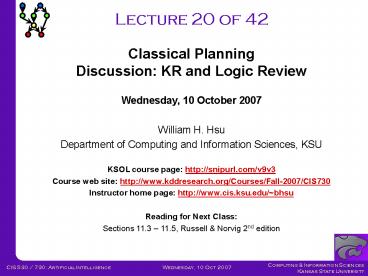CIS730-Lecture-20-20071010 - PowerPoint PPT Presentation
1 / 27
Title:
CIS730-Lecture-20-20071010
Description:
Friday's Reading: Sections 11.3 11.7, R&N 2e. Today. Classical planning. STRIPS representation ... Wednesday or Friday. Computing & Information Sciences ... – PowerPoint PPT presentation
Number of Views:17
Avg rating:3.0/5.0
Title: CIS730-Lecture-20-20071010
1
Lecture 20 of 42
Classical Planning Discussion KR and Logic Review
Wednesday, 10 October 2007 William H.
Hsu Department of Computing and Information
Sciences, KSU KSOL course page
http//snipurl.com/v9v3 Course web site
http//www.kddresearch.org/Courses/Fall-2007/CIS73
0 Instructor home page http//www.cis.ksu.edu/bh
su Reading for Next Class Sections 11.3 11.5,
Russell Norvig 2nd edition
2
Lecture Outline
- Last Week Knowledge Rep, Ontologies, Situational
Calculus - Todays Reading Sections 11.1 11.2, RN 2e
- Fridays Reading Sections 11.3 11.7, RN 2e
- Today
- Classical planning
- STRIPS representation
- Basic algorithms
- Friday
- Midterm exam review search and constraints, game
tree search - Planning continued
- Midterm Exam Fri 19 Oct 2007
- Remote students have exam agreement faxed to DCE
- Exam will be faxed to proctors Wednesday or Friday
3
Midterm Review IAs, SearchUnclear Points?
- Artificial Intelligence (AI)
- Operational definition study / development of
systems capable of thought processes
(reasoning, learning, problem solving) - Constructive definition expressed in artifacts
(design and implementation) - Intelligent Agent Framework
- Reactivity vs. state
- From goals to preferences (utilities)
- Methodologies and Applications
- Search game-playing systems, problem solvers
- Planning, design, scheduling systems
- Control and optimization systems
- Machine learning hypothesis space search (for
pattern recognition, data mining) - Search
- Problem formulation state space (initial /
operator / goal test / cost), graph - State space search approaches
- Blind (uninformed) DFS, BFS, BB
- Heuristic (informed) Greedy, Beam, A/A
Hill-Climbing, SA
4
(No Transcript)
5
(No Transcript)
6
Midterm Review KR, Logic, Proof TheoryUnclear
Points?
- Logical Frameworks
- Knowledge Bases (KB)
- Logic in general representation languages,
syntax, semantics - Propositional logic
- First-order logic (FOL, FOPC)
- Model theory, domain theory possible worlds
semantics, entailment - Normal Forms
- Conjunctive Normal Form (CNF)
- Disjunctive Normal Form (DNF)
- Horn Form
- Proof Theory and Inference Systems
- Sequent calculi rules of proof theory
- Derivability or provability
- Properties
- Knowledge bases, WFFs consistency,
satisfiability, validity, entailment - Proof procedures soundness, completeness
decidability (decision)
7
(No Transcript)
8
(No Transcript)
9
(No Transcript)
10
(No Transcript)
11
Midterm Review Game TreesUnclear Points?
- Games as Search Problems
- Frameworks
- Concepts utility, reinforcements, game trees
- Static evaluation under resource limitations
- Family of Algorithms for Game Trees Minimax
- Static evaluation algorithm
- To arbitrary ply
- To fixed ply
- Sophistications iterative deepening, alpha-beta
pruning - Credit propagation
- Intuitive concept
- Basis for simple (delta-rule) learning algorithms
- State of The Field
- Uncertainty in Games Expectiminimax and Other
Algorithms
12
(No Transcript)
13
Search versus Planning 1
Adapted from slides by S. Russell, UC Berkeley
14
Planning in Situation Calculus
Adapted from slides by S. Russell, UC Berkeley
15
STRIPS Operators
Adapted from slides by S. Russell, UC Berkeley
16
State Space versus Plan Space
Adapted from slides by S. Russell, UC Berkeley
17
Describing Actions 1 Frame,Qualification, and
Ramification Problems
Adapted from slides by S. Russell, UC Berkeley
18
Describing Actions 2Successor State Axioms
Adapted from slides by S. Russell, UC Berkeley
19
Making Plans
Adapted from slides by S. Russell, UC Berkeley
20
Making PlansA Better Way
Adapted from slides by S. Russell, UC Berkeley
21
First-Order LogicSummary
Adapted from slides by S. Russell, UC Berkeley
22
Partially-Ordered Plans
Adapted from slides by S. Russell, UC Berkeley
23
POP Algorithm 1Sketch
Adapted from slides by S. Russell, UC Berkeley
24
POP Algorithm 2Subroutines and Properties
Adapted from slides by S. Russell, UC Berkeley
25
Clobbering andPromotion / Demotion
Adapted from slides by S. Russell, UC Berkeley
26
Summary Points
- Previously Logical Representations and Theorem
Proving - Propositional, predicate, and first-order logical
languages - Proof procedures forward and backward chaining,
resolution refutation - Today Introduction to Classical Planning
- Search vs. planning
- STRIPS axioms
- Operator representation
- Components preconditions, postconditions (ADD,
DELETE lists) - Friday More Classical Planning
- Partial-order planning (NOAH, etc.)
- Limitations
27
Terminology
- Classical Planning
- Planning versus search
- Problematic approaches to planning
- Forward chaining
- Situation calculus
- Representation
- Initial state
- Goal state / test
- Operators
- Efficient Representations
- STRIPS axioms
- Components preconditions, postconditions (ADD,
DELETE lists) - Clobbering / threatening
- Reactive plans and policies
- Markov decision processes
Adapted from slides by S. Russell, UC Berkeley






























